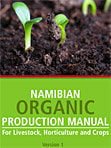Livestock management practices in Namibia are generally already closely aligned with organic agricultural practices. This series of factsheets provides an overview of organic livestock management and organic food markets in Namibia and abroad, with each factsheet focusing on different aspects of organic livestock production.
Factsheet 1 Organic meat production in Namibia
Factsheet 2 Benefit of organic grass-fed livestock
Factsheet 3 Organic slaughter & processing
Factsheet 4 Market opportunities for organic beef
Factsheet 5 Alternative Feed & Supplements for Organic Livestock
Facrsheet 6 Organic crop production for animal feed
Afrikaans Version- Organic Livestock
Factsheet 1 Organiese vleisproduksie in Namibië
Factsheet 2 Voordele van organies-veldafgeronde vee
Factsheet 3 Organiese slag en verwerking
Factsheet 4 Markgeleenthede vir organiese beesvleis
Factsheet 5 Alternatiewever en aanvullings vir organiese vee
Factsheet 6 Organiese gewasproduksie vir veevoer
Organic livestock production: Videos
The series of videos on organic livestock production is based on the content that is in the organic livestock factsheets. Footage was taken on Farm Krumhuk, an organic and biodynamic farm on the outskirts of Windhoek. Each video gives an introduction to key aspects of organic livestock management (e.g. sustainable grazing practices, adapted breeds, animal welfare and market opportunities for organic meat) and the health benefits of organic meat for the consumer.
Introduction to Organic Agriculture
Animal Welfare
Adapted Breeds
Sustainable Grazing
Feeding Organic Livestock
Health Benefits
Organic Markets
Regenerative grazing: Case studies
The three case studies highlighted in this publication are sourced from the National Agricultural Union’s work, "Regenerating Namibian Livestock Farmers," which supports the government’s 2019 Regenerative Livestock Production Strategy. These case studies illustrate how Namibian farmers are applying regenerative principles on their farms through sustainable grazing management systems. Each farm employs regenerative grazing methods in a way that suits the farm’s management principles and animals, in an effort to regenerate degraded land, to build soil health and avoid soil erosion, and to enhance resilience against challenges like climate shocks, including the recent drought. Additionally, these case studies showcase the benefits of a diversified farming approach, which results in increased production, improved profitability per hectare over time and better resource management..
Full case studies
Let us know what you think or enquire about details.
Email us at info@noa.org.na or 0816633224




